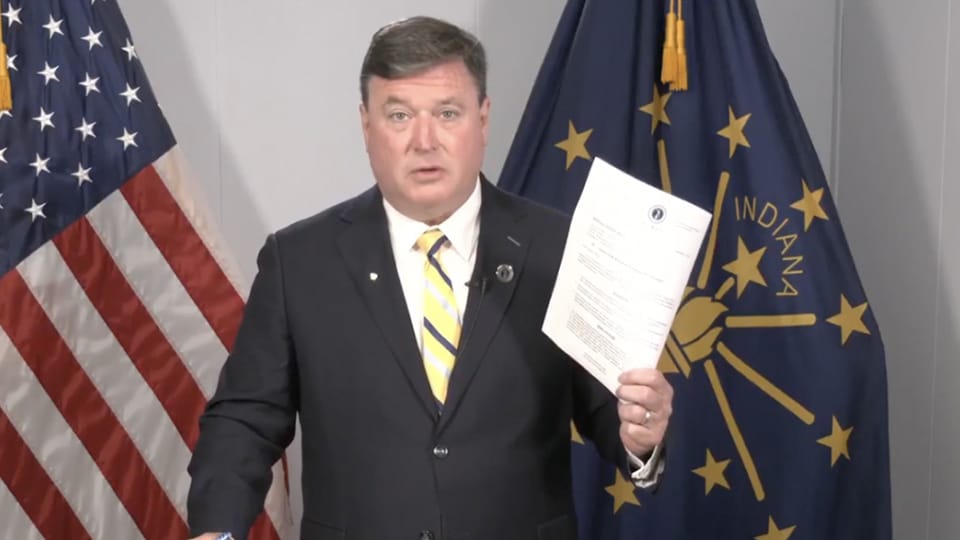Rokita files response in disciplinary case
Subscriber Benefit
As a subscriber you can listen to articles at work, in the car, or while you work out. Subscribe Now
Indiana Attorney General Todd Rokita submitted a new and bombastic filing on Wednesday accusing the Indiana Supreme Court Disciplinary Commission of caving to outside pressure in a “political melee,” saying it could no longer give him fair treatment.
“The Commission needs to be disentangled from ongoing politics driven by political commentators. If the Commission is not cordoned-off from the political stage, then its meetings need to be made fully public…” the filing read.
Many of the filings and decisions of the commission are private, unless the Indiana Supreme Court decides it would be in the public interest to publicize them — which the commission petitioned for in his disciplinary case. Rokita said he doesn’t oppose a motion to unseal the conditional agreement, so long as all of the deliberations and meetings related to him fall under the same “extraordinary circumstances.”
In his conclusion, Rokita said that his “style and content” were not grounds for the Commission to discipline him as a lawyer.
“Respondent is vocal, aggressive, and successful regarding policies important to Hoosiers. He speaks in a manner that the ‘Establishment’ abhors. The content of his conservative message offends the Left, if not Liberals,” the filing continued. “… His press release (in November) made clear those facts in his combative style, but nothing written rendered his Affidavit false or defied the Supreme Court.”
Background
In a November split decision and public reprimand, the Indiana Supreme Court found he had violated two of the Rules of Professional Conduct for lawyers:
- They said Rokita’s comments constituted an “extrajudicial statement” that he knew — or reasonably should’ve known — would be publicly disseminated and would prejudice related legal proceedings.
- They also said his statements had “no substantial purpose” other than to embarrass or burden Dr. Caitlin Bernard.
The misconduct stems from his televised comments about Bernard, an OB-GYN who performed an abortion on a 10-year-old rape victim from Ohio and was later disciplined before the Medical Licensing Board for discussing the procedure publicly.
In an interview with Fox News commentator Jesse Watters, Rokita called Bernard an “activist acting as a doctor” and said his office would be investigating her conduct.
However, both Chief Justice Loretta Rush and Justice Christopher Goff dissented in a 3-2 split ruling, saying Rokita’s punishment — which included $250 in court costs — was too lenient.
Following the reprimand, Rokita shared a lengthy and unrepentant statement defending his “true” remarks in which he attacked the news media, medical field and “cancel culture.”
Shortly after, the disciplinary commission filed to unseal Rokita’s conditional agreement, saying, “Respondent’s actions flouted the authority of the Court, called into question the sincerity of Respondent’s assertions to the Court in his Conditional Agreement and affidavit, and caused damage to the public’s perception of the integrity and justness of the attorney discipline system…”
Rokita filing
Rokita pushed back against that claim, saying “the Commission want(ed) to change the rules after the final horn sounded” and he had already accepted discipline.
In the new filing, Rokita said he would have agreed to waive confidentiality but “the Commission additionally required a gag order” on him, “prohibiting him from talking publicly with constituents about his decision to waive confidentiality…”
“… Rokita believes a gag order is something an attorney general cannot agree to because it is a disservice to the directness and accountability Hoosiers deserve from elected officials and otherwise is not something government should impose on people,” the filing read.
Even while calling for full transparency from the commission, Rokita noted that such a release would “increase political commentary, which could potentially pollute new investigations or proceedings initiated since the press release.”
He further added that the commission’s argument to release the agreement violates its own rules, specifically when it came to the risk of harm to a party and creating prejudice against the party in future proceedings.
“… The Commission’s assertion that extraordinary circumstances exist is not supported by anything more than the fact that (Rokita) is a statewide elected official who has a big platform and high visibility for a press release,” the filing read.
Rokita is the second Indiana Attorney General in a row to be disciplined by the Indiana Supreme Court. Curtis Hill’s law license was suspended for 30 days after finding he committed battery and violated other professional conduct rules.
Hill lost to Rokita in a Republican convention in 2020 and is now running for governor.
The Indiana Capital Chronicle is an independent, not-for-profit news organization that covers state government, policy and elections.
